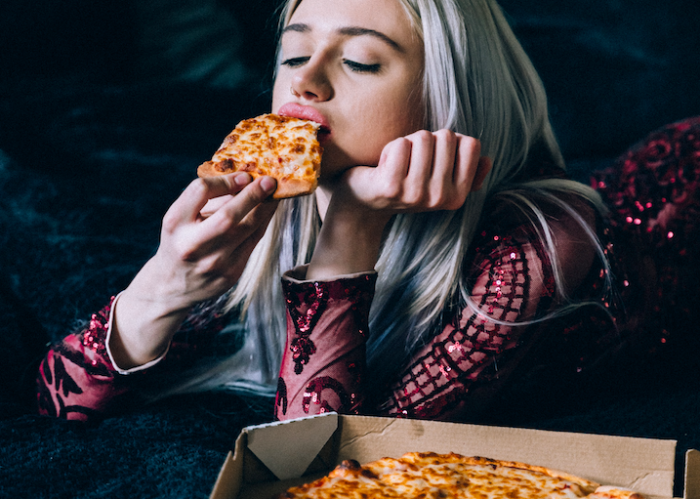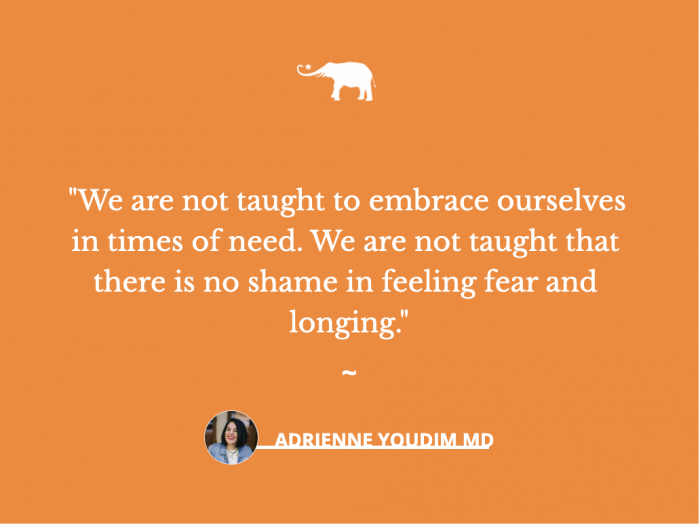When the quarantine began in the spring of 2020 due to the novel Coronavirus, I had already finished 350 pages of what I thought was a first draft of my weight loss book and was excited about the prospect of finally completing the manuscript.
I thought perhaps the silver lining to a worldwide pandemic was time, space, and the emotional wellspring that allowed for writing. I felt deeply that this was an opportunity to take stock of what was truly important, to realign with my values, and to eliminate what did not serve me.
But there wasn’t much time. There wasn’t much space. And while my emotions were heightened, they were not available to me as a source of creativity or inspiration.
There was a beauty in all of us being under one roof, but there was also a nervous energy. The kids needed extra hugs and extra reassurance. My seven-year-old took up residence in my bed, sleeping between my husband and me for what seemed to be an indefinite arrangement. There were constant disruptions in my work to make lunch or to sharpen a pencil. The house was busting at the seams with clutter. Notebooks and pencils on the floor, used masks strewn all around the house, piles of shoes at the doorway, and a sink perpetually filled with dishes waiting for me at the close of my workday.
My phone dinged repeatedly with an incessant stream of text messages from friends and family unloading anxieties about this virus they felt that I, as a physician, could relieve. Not to mention the mind-boggling conspiracy theories, the unveiling of social injustice, and the political upheaval that shocked, pained, and enraged me.
Sheltering from home took away any semblance of boundaries and personal space and allowed for unprecedented access to me, physically and emotionally. It did not feel like I was taking stock. It felt like chaos. And yet I was keenly aware of my privilege.
I was not on the front lines; I had the luxury of working from home; I was healthy; I was not isolated—and yet I was unraveling.
Meanwhile, my routines were deteriorating.
My husband, a surgeon, was unable to work from home and expended his creative energy by cooking and baking. Night after night, we indulged on decadent dinners and sourdough bread. Lots and lots of bread. At first, I shrugged my shoulders at the scale. As far as I could tell, the entire planet was gaining weight during quarantine. Besides, I ate, slept, and breathed diet and nutrition. I knew how to take off the pounds when I was ready.
But in my indifference, a few pounds became a few more. And then, something happened. I started to wrinkle my nose at my reflection in the mirror. I started to feel resentment at the bulge forming around my midsection. Not that I was swooning over myself pre-pandemic, but certainly gone were the days when my self-perception was tied to micro-changes in my girth or the numbers on the scale. I was no longer that child who wished for the genetics of someone slender and tall. I was no longer the teen who scrutinized every inch of my body. There was no guilt or shame, anger, or resentment.
I had been at peace with my body for years. And then we were quarantined.
I remember thinking, Really? Have I come back to this, again?
Meanwhile, I continued to consult with patients, and I was seeing all of this play out on a grand scale. I was witnessing en masse how boredom, listlessness, sadness, loneliness, fear, anxiety, and social isolation were kicking up old wounds and dormant hungers. Given my privilege to talk to patients from my living room in the midst of such trying circumstances, I was reminded that hunger is universal. Hunger for certainty, self-acceptance, belonging, and connection is a universal human experience.
Life and circumstance—be it sickness, divorce, abuse, trauma, hardships, both big and small—will upend us again and again and again and reveal our hunger.
Unfortunately, we are not taught to understand this hunger, nor are we allowed to tolerate it. We are not taught to embrace ourselves in times of need. We are not taught that there is no shame in feeling fear and longing. Rather, we are conditioned to swallow them. We liken our hunger to an affliction, a scarlet letter that inadvertently exposes our humanity. Ironically, all the suppressing and rejecting only magnifies our hunger and the fear that it cannot be satisfied, averting our attention from the invitation that it presents—the invitation to accept our common humanity with understanding and self-compassion.
A longtime patient of mine—we will call him Craig—was seeing me weekly for virtual visits during this time as he needed the extra support in the midst of all this uncertainty. Craig had a childhood history of sexual abuse and abused drugs and alcohol as a young adult. Sobriety transferred his addiction to food, and he struggled with weight cycling for years prior to coming to see me. When we met, the timing seemed right. He had just had his first child. He was in therapy. His home life and work-life were stable, and he was entering his fifth year drug and alcohol-free.
By the time we transitioned to virtual visits, Craig had already lost 65 pounds—the most weight loss he had ever achieved. He was pleased, and I was too, pleased yet cautious. After over a decade of this work, I knew that no one ever fully arrives. No one loses 65 pounds to the sound of blaring trumpets and confetti, at which point they ride off into the sunset to the sounds of happily ever after. Arriving would mean our work is done, and we all know that our work is never really done.
For the first several weeks of the pandemic, Craig continued to do well, surprisingly upbeat despite the uncertainty. And then a few months in, he lost his job. Several weeks later, his mother was diagnosed with cancer. The heartache was just too much to bear and triggered old patterns. The feelings of sadness and loss brought up old traumas that drove him to old habits he had not engaged in over the years that we had worked together. His first “off-the-wagon” experience, as he put it, was a night of bingeing. He had eaten an entire pizza alone. But he was able to recognize the trigger and bring himself back.
“That’s resilience,” I said, in response to the shame reflected in his downtrodden eyes.
The next week, Craig skipped his appointment with me. I could only imagine that maybe he was bingeing again, and that shame or disappointment or self-condemnation kept him from coming back. I wished I could tell him that Katie, whom I had just spoken to, was also struggling. So were Marty and James, and yet with an abundance of self-compassion, they had persevered and resumed their course. I wished I could console him that this process of coming to terms with food, to coming to terms with our hunger, is a reckoning, an evolution, a gradual unfolding whereby weaknesses and shortcomings shape and mold us to a more resilient and self-assured place.
Everyone faces road bumps at some point. Sometimes the setbacks are so slight that they are perceived by no one but us, and other times they feel insurmountable. But either way, no one evades the process.
I wanted to tell him that I too am struggling but opted against self-disclosure. And so, in the midst of sourdough bread and wine, Craig inspired me to sit at my computer again to write his story, to write my stories, and to write the stories of many that I have collected over the years—the stories that describe what it is that we are truly hungry for.
~
*Excerpt from Hungry for More: Stories and Science to Inspire Weight Loss from the Inside Out
~












Read 0 comments and reply